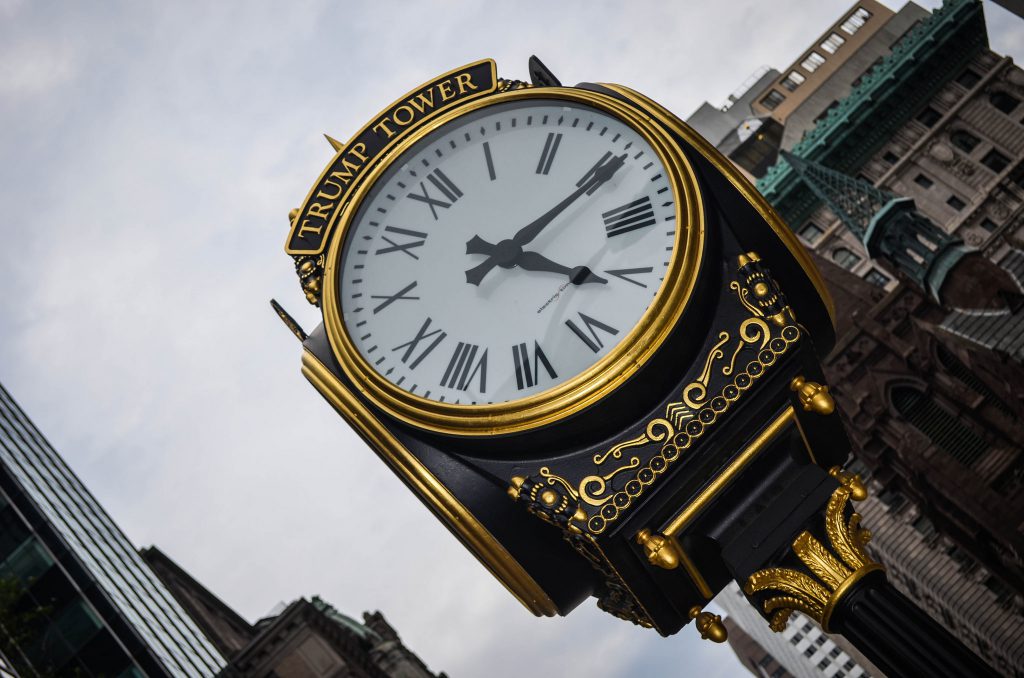Limited ‘Trump time’ has implications for Australia
Posted By Ryan Hawkins on November 7, 2017 @ 11:00

Donald Trump sows a great deal of uncertainty, but there’s every indication that he’ll see less of the Australian prime minister than did his two immediate predecessors, Presidents George W. Bush and Barack Obama.
Consider each president’s first year in office. John Howard met Bush in the Oval Office in September 2001 during a four-day visit when he also commemorated the 50th anniversary of the ANZUS treaty, hosted the president and a third of his cabinet [1] at the Australian ambassador’s residence, and was coincidentally in Washington when the 9/11 terrorist attacks occurred. Kevin Rudd made two trips to the White House in 2009, in what Obama called a ‘great meeting of the minds [2]’, and saw the new president at several multilateral summits that year.
The length and quality of leader-to-leader engagement between the US and Australia in the first year of the Trump administration has been lower, and not just because of that phone call [3]. While Trump and Malcolm Turnbull seemingly soothed any lingering tensions in a 45-minute meeting [4] prior to the Coral Sea commemoration event in New York in May, and are expected to hold a second [5] in Asia next week, Trump won’t have spent much time with his Australian counterpart by the end of his first year in the presidency.
Looking ahead, that’s not likely to change. Trump’s aversion to travel, the delicately poised Australian parliament, and an upcoming federal election don’t foreshadow a high level of engagement between the 45th president and Australia’s prime minister.
A new database [6] compiled by the United States Studies Centre enables direct comparisons between Trump and his two predecessors. The database chronicles every in-person interaction between Bush, Obama and Trump (so far) with Australian prime ministers, and shows that over the past 16 years the US president has interacted with his Australian counterpart in either a formal or informal capacity an average of 3.4 times per year.
The US president has hosted the Australian prime minister in the Oval Office on 12 occasions since Bush was inaugurated in January 2001—more than the comparable figure for both the Japanese (10) and Canadian (11) prime ministers [7]. Bush and Obama each visited Australia twice during their presidencies—they logged one international summit and one bilateral visit apiece, including presidential addresses to the Australian parliament in 2003 and 2011. During their two-term presidencies, Bush held more official working visits with his Australian counterpart (10) than Obama (6), but Obama attended a regional or global summit with the Australian prime minister on no fewer than 28 occasions.
The upward trend in the frequency of personal contact—if not necessarily the length or depth of direct leader-to-leader engagement—under President Obama was primarily due to his prolific attendance at multilateral meetings. In addition to long-standing presidential and prime ministerial attendance at summits such as the UN General Assembly, APEC and NATO, the US has attended the G20 since Bush first hosted the grouping in 2008. Obama first attended the East Asia Summit in 2011 and only missed one thereafter (in 2013, but only because he was dealing with a US government shutdown at the time).
By contrast, Trump has shown himself to be less willing to travel interstate, let alone overseas, than presidents before him: one New York Times journalist labelled Trump a ‘homebody president [8]’. Trump’s first foreign trip [9] was on 20 May—the latest first foreign trip in more than 50 years [10] by a US president.
The White House’s initial suggestion [11] that the president would not attend next week’s East Asia Summit (a decision that has now been reversed [12]), despite being in the Philippines the day before, was the latest indicator that the Trump administration holds a dim view of multilateral engagement. The US has either left or is threatening to leave the Trans-Pacific Partnership, the Paris Climate Agreement, UNESCO, NAFTA and the Iran nuclear deal. This ‘withdrawal doctrine [13]’, in combination with the president’s aversion to foreign travel, portends a lower level of US–Australia leader-to-leader contact throughout Trump’s presidency.
Whether or not Trump manages a visit to Australia—and follows his predecessors by addressing the Australian parliament—it’s time for Australian stewards of the alliance to grapple with the implications of limited ‘Trump time’.
Article printed from The Strategist: https://www.aspistrategist.org.au
URL to article: https://www.aspistrategist.org.au/limited-trump-time-has-implications-for-australia/
URLs in this post:
[1] hosted the president and a third of his cabinet: https://interactives.lowyinstitute.org/publications/assets/Curran_The_Prime_Ministers_in_America_WEB.pdf
[2] great meeting of the minds: http://www.smh.com.au/national/obama-lauds-rudd-in-meeting-of-the-minds-20090325-9aip.html
[3] that phone call: http://www.abc.net.au/news/2017-08-04/donald-trump-malcolm-turnbull-refugee-phone-call-transcript/8773422
[4] 45-minute meeting: http://www.theaustralian.com.au/national-affairs/donald-trump-to-meet-malcolm-turnbull-in-new-york-live-coverage/news-story/acbebfc4e526fe000f2012b4c67a281d
[5] expected to hold a second: http://www.smh.com.au/federal-politics/political-news/malcolm-turnbull-to-meet-donald-trump-for-sensitive-talks-on-north-korea-china-20171031-gzbjto.html
[6] new database: https://www.ussc.edu.au/analysis/when-the-us-president-met-the-australian-prime-minister-a-historical-timeline
[7] more than the comparable figure for both the Japanese (10) and Canadian (11) prime ministers: https://history.state.gov/departmenthistory/visits
[8] homebody president: https://www.nytimes.com/2017/04/16/us/politics/travel-trump-obama-bush.html
[9] first foreign trip: http://www.bbc.com/news/world-us-canada-39995387
[10] in more than 50 years: https://history.state.gov/departmenthistory/travels/president
[11] initial suggestion: https://www.washingtonpost.com/news/josh-rogin/wp/2017/10/24/trump-to-skip-key-asia-summit-in-philippines-to-go-home-earlier/
[12] reversed: http://publicpool.kinja.com/subject-background-briefing-on-president-trumps-visit-1820154835
[13] withdrawal doctrine: https://twitter.com/RichardHaass/status/918471381511229440?ref_src=twsrc%5Etfw&ref_url=https%3A%2F%2Fwww.washingtonpost.com%2Fnews%2Fworldviews%2Fwp%2F2017%2F10%2F13%2Fditching-deals-has-become-trumps-main-foreign-policy%2F
Click here to print.